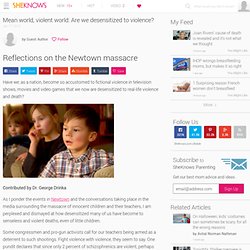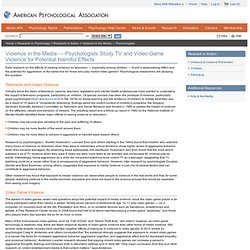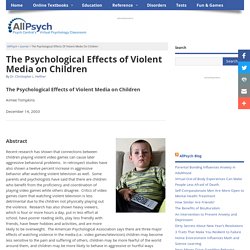

Mean world, violent world: Are we desensitized to violence? Have we, as a nation, become so accustomed to fictional violence in television shows, movies and video games that we now are desensitized to real-life violence and death?

Contributed by Dr. George Drinka As I ponder the events in Newtown and the conversations taking place in the media surrounding the massacre of innocent children and their teachers, I am perplexed and dismayed at how desensitized many of us have become to senseless and violent deaths, even of little children. Some congressmen and pro-gun activists call for our teachers being armed as a deterrent to such shootings.
Fight violence with violence, they seem to say. Digging deeper In short, we live in a society in which even a public conversation over minimal actions that might avert future deaths is tilted toward doing little or nothing. Violent Media Numb Viewers To The Pain Of Others. Violent video games and movies make people numb to the pain and suffering of others, according to a research report published in the March 2009 issue of Psychological Science.

The report details the findings of two studies conducted by University of Michigan professor Brad Bushman and Iowa State University professor Craig Anderson. The studies fill an important research gap in the literature on the impact of violent media. In earlier work, Bushman and Anderson demonstrated that exposure to violent media produces physiological desensitization—lowering heart rate and skin conductance—when viewing scenes of actual violence a short time later. But the current research demonstrates that violent media also affect someone's willingness to offer help to an injured person, in a field study as well as in a laboratory experiment.
Violence in the Media — Psychologists Study TV and Video Game Violence for Po... Anderson, C.A., Ihori, Nobuko, Bushman, B.J., Rothstein, H.R., Shibuya, A., Swing, E.L., Sakamoto, A., & Saleem, M. (2010).

Violent Video Game Effects on Aggression, Empathy, and Prosocial Behavior in Eastern and Western Countries: A Meta-Analytic Review. Psychological Bulletin, Vo. 126, No. 2. The Effects of Violence in Media. When two young gunmen, Eric Harris and Dylan Klebold, killed 13 students and a teacher, and injured 21 before killing themselves in 1999, an ongoing, fiery debate about the media's influence was once again ignited.

The 1999 Columbine High School massacre and extensive coverage of the event by news programs, documentaries, books and blogs appeared to side with those who believe that violence depicted graphically in movies and video games causes, contributes to, and influences violent behavior and even murder. Both Harris and Klebold played violent "murder-simulation" video games, and were fans of the controversial movie "Natural Born Killers" about a husband and wife pair of mass murderers who received intense media coverage. News reports said that the boys watched this movie many times and knew the dialogue verbatim.
"There hasn't been one psychological research study - ever - that helped predict or understand the Columbine shootings," he said. What do We Know About Media Violence? The reality is that we have not yet successfully defined violence and aggression, whether when analyzing the content we consume, or investigating the potentially resultant aggressive behaviour.

Because individual studies define these notions differently, the goal posts are constantly moving for anyone who is trying to get a big picture look at the situation. The difficulty of quantifying aggression and violence in a strict way makes it nearly impossible to accurately answer the question “Does media violence cause people to commit violence?” Back in 1994 Andrea Martinez at the University of Ottawa conducted a comprehensive review of the scientific literature on media violence for the Canadian Radio-television and Telecommunications Commission (CRTC). She concluded that the lack of consensus about media effects reflects three “grey areas” or constraints contained in the research itself. These grey areas still apply today. Tips on How to Deal with Media Violence. Kids and Violence in Media. With every school shooting, like December’s horrific massacre in Newtown, questions about guns in media and their connection to real-life violence bubble to the surface again.

After all, there have been reports that Sandy Hook shooter Adam Lanza was a fan of the ultra-bloody Call of Duty video game series. But almost 13 years after Columbine, the connection is still murky. What does research really say about the connection between our kids and the gun-heavy imagery they see on screens? What—and how much—should parents do to mitigate aggressive copycat behavior?
The Star Wars Problem It was not my proudest parenting moment. He started pew-pew-pew-ing the next day. Julian turned everything (Tinker Toys, tennis rackets, you name it) into a pretend gun and started running around the house like a pint-size Han Solo taking down Storm Troopers. The Effects of Television Violence on Children: Testimony of Dr. Dale Kunkel, University of Arizona.
It is well established by a compelling body of scientific evidence that television violence poses a risk of harmful effects for child-viewers.

While exposure to media violence is not necessarily the most potent factor contributing to real world violence and aggression in the United States today, it is certainly the most pervasive. Millions of children spend an average of 20 or more hours per week watching television, and this cumulative exposure to violent images can shape young minds in unhealthy ways. Given the free-speech guarantees of the First Amendment, the courts have ruled that there must be evidence of a “compelling governmental interest” in order for Congress to take action that would regulate television content in any way, such as the indecency regulations enforced by the FCC.
There has been a lot of talk in recent weeks about the U.S. Court of Appeals (2nd Circuit) ruling regarding “fleeting expletives” that were cited as indecent by the FCC (Fox et al. v. The Psychological Effects of Violent Media on Children. The Psychological Effects of Violent Media on Children Aimee Tompkins December 14, 2003 Abstract Recent research has shown that connections between children playing violent video games can cause later aggressive behavioral problems.

In retrospect studies have also shown a twelve percent increase in aggressive behavior after watching violent television as well. Everything that children see or hear in the media early on in their lives affects them in some way. Current research tends to agree with the proponents who argue that violent media is associated with aggressive behavior. How to help kids cope with violence in the media. Violence in the Media — Psychologists Study TV and Video Game Violence for Potential Harmful Effects.
Anderson, C.A., Ihori, Nobuko, Bushman, B.J., Rothstein, H.R., Shibuya, A., Swing, E.L., Sakamoto, A., & Saleem, M. (2010).

Violent Video Game Effects on Aggression, Empathy, and Prosocial Behavior in Eastern and Western Countries: A Meta-Analytic Review. Psychological Bulletin, Vo. 126, No. 2. Anderson, C. Don't blame the video games. By Fareed Zakaria Vice President Joe Biden was meeting video game representatives yesterday as the Obama administration and the U.S. public grapples with the question of gun crime – and why it is so much more prevalent in America than other rich countries.

The oft-debated premise behind such talks is clear. Young males weaned on a diet of violent and graphic images, it is argued, are more likely to engage in deadly violence themselves. But the actual data suggests something quite different. Is media violence damaging to kids? With every school shooting, like December's horrific massacre in Newtown, questions about guns in media and their connection to real-life violence bubble to the surface again. After all, there have been reports that Sandy Hook shooter Adam Lanza was a fan of the ultra-bloody Call of Duty video game series. But almost 13 years after Columbine, the connection is still murky. What does research really say about the connection between our kids and the gun-heavy imagery they see on screens?
What -- and how much -- should parents do to mitigate aggressive copycat behavior? The "Star Wars" problemIt was not my proudest parenting moment. He started pew-pew-pew-ing the next day. Julian turned everything (Tinker Toys, tennis rackets, you name it) into a pretend gun and started running around the house like a pint-size Han Solo taking down Storm Troopers. Violence in Media Parent Concern. Violence Prevention Home Page - cdc.gov. Violence in the Media: What Effects on Behavior? Speculation as to the causes of the recent mass shooting at a Batman movie screening in Colorado has reignited debates in the psychiatric community about media violence and its effects on human behavior.
“Violence in the media has been increasing and reaching proportions that are dangerous,” said Emanuel Tanay, MD, a retired Clinical Professor of Psychiatry at Wayne State University and a forensic psychiatrist for more than 50 years. “You turn on the television, and violence is there. You go to a movie, and violence is there,” Tanay told Psychiatric Times. “Reality is distorted. If you live in a fictional world, then the fictional world becomes your reality.” The average American watches nearly 5 hours of video each day, 98% of which is watched on a traditional television set, according to Nielsen Company. Tanay noted, “Anything that promotes something can be called propaganda.” Tanay did acknowledge, however, that some mentally ill individuals are vulnerable to dramatized violence.
Violence, The Media And Your Brain.